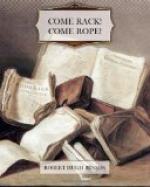“Mr. Alban,” broke in the old man, “you had best do nothing at all. You were not followed from Derby; you are as safe in Padley or here as you could be anywhere in England. All that you had best do is to remain here a week or two and not go down to Derby again for the present. I think that showing of yourself openly in towns hath its dangers as well as its safeguards.”
Mr. John glanced round. Marjorie bowed her head in assent.
“I will do precisely as you say,” said Robin easily. “And now for the news of her Grace’s servants.”
He had already again and again told the tale of Fotheringay so far as he had seen it in this very parlour. At first he had hardly found himself able to speak of it without tears. He had described the scene he had looked upon when, in the rush that had been made towards the hall after Mary’s head had been shown at the window, he had found a place, and had been forced along, partly with his will and partly against it, right through the great doors into the very place where the Queen had suffered; and he had told the story so well that his listeners had seemed to see it for themselves—the great hall hung with black throughout; the raised scaffold at the further end beside the fire that blazed on the wide hearth; the Queen’s servants being led away half-swooning as he came in; the dress of velvet, the straw and the bloody sawdust, the beads and all the other pitiful relics being heaped upon the fire as he stood there in the struggling mob; and, above all, the fallen body, in its short skirt and bodice lying there where it fell beside the low, black block. He had told all this as he had seen it for himself, until the sheriff’s men drove them all forth again into the court; and he had told, too, of all that he had heard afterwards, that had happened until my lord Shrewsbury’s son had ridden out at a gallop to take the news to court, and the imprisoned watchers had been allowed to leave the Castle; how the little dog, that he had heard wailing, had leapt out as the head fell at the third stroke, so that he was all bathed in his mistress’ blood—one of the very spaniels, no doubt, which he himself had seen at Chartley; how the dog was taken away and washed and given afterwards into Mr. Melville’s charge; how the body and the head had been taken upstairs, had been roughly embalmed, and laid in a locked chamber; how her servants had been found peeping through the keyhole and praying aloud there, till Sir Amyas had had the hole stopped up. He had told them, too, of the events that followed; of the mass M. de Preau had been permitted to say in the Queen’s oratory on the morning after; and of the oath that he had been forced to take that he would not say it again; of the destruction of the oratory and the confiscation of the altar furniture and vestments.




